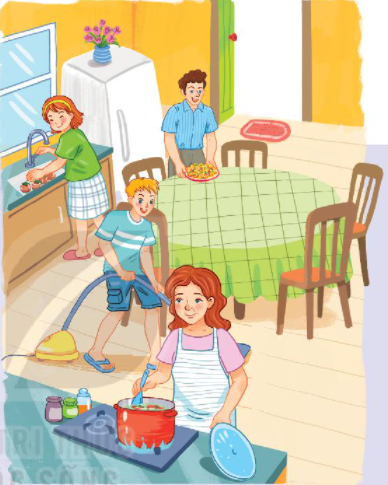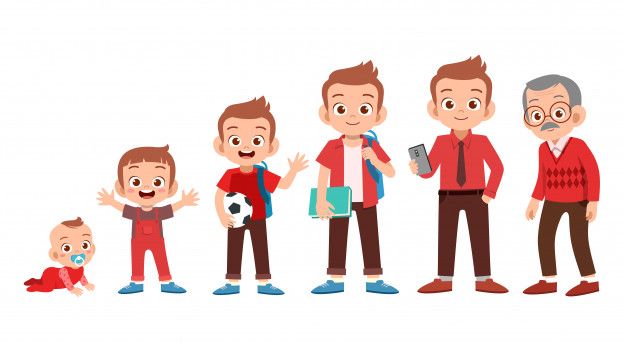Đừng bỏ lỡ những tính năng hấp dẫn của Baitap365.com
Unit 1: Family life
1. Work in pairs. Look at the picture and answer the questions. 2. Read the text and tick (✓) the appropriate meanings of the highlighted words. 3. Read the text again and answer the questions. 4. Work in pairs. Discuss the question.
Bài 1
Benefits of doing housework
(Những lợi ích khi làm việc nhà)
1. Work in pairs. Look at the picture and answer the questions.
(Làm việc theo cặp. Nhìn bức tranh và trả lời các câu hỏi.)
1. What is each person in the picture doing?
(Mỗi người trong bức tranh đang làm gì?)
2. Do you think that they are happy? Why or why not?
(Em có nghĩ rằng họ đang hạnh phú không? Tại sao hoặc tại sao không?)

Bài 2
2. Read the text and tick (✓) the appropriate meanings of the highlighted words.
(Đọc văn bản và đánh dấu nghĩa thích hợp của các từ được làm nổi bật.)

 Most people think that housework is boring and is the responsibility of wives and mothers only. Many parents don't ask their children to do housework so that they have more time to play or study. However, studies show doing chores is good for children.
Most people think that housework is boring and is the responsibility of wives and mothers only. Many parents don't ask their children to do housework so that they have more time to play or study. However, studies show doing chores is good for children.

 Kids who do housework develop important life skills that they will need for the rest of their lives. Doing the laundry, cleaning the house, and taking care of others are among the important skills that children will need when they start their own families. These are the things that schools cannot fully teach, so it's important for children to learn them at home. Sharing housework also helps young people learn to take responsibility. They know that they have to try to finish their tasks even though they do not enjoy doing them. Doing chores also helps develop children's gratitude to their parents. When doing housework, they learn to appreciate all the hard work their parents do around the house for them. In addition, doing chores together helps strengthen family bonds, creating special moments between children and parents. It makes children feel they are members of a team.
Kids who do housework develop important life skills that they will need for the rest of their lives. Doing the laundry, cleaning the house, and taking care of others are among the important skills that children will need when they start their own families. These are the things that schools cannot fully teach, so it's important for children to learn them at home. Sharing housework also helps young people learn to take responsibility. They know that they have to try to finish their tasks even though they do not enjoy doing them. Doing chores also helps develop children's gratitude to their parents. When doing housework, they learn to appreciate all the hard work their parents do around the house for them. In addition, doing chores together helps strengthen family bonds, creating special moments between children and parents. It makes children feel they are members of a team.

 All in all, doing housework can bring a lot of benefits to children. It teaches them life skills and helps build their character. Therefore, parents should encourage their kids to share the housework for their own good as well as the good of the whole family.
All in all, doing housework can bring a lot of benefits to children. It teaches them life skills and helps build their character. Therefore, parents should encourage their kids to share the housework for their own good as well as the good of the whole family.
1. responsibility (trách nhiệm)
a. duty (nghĩa vụ)
b. hobby (sở thích)
2. gratitude (lòng biết ơn)
a. the feeling of being great (cảm giác tuyệt vời)
b. the feeling of being grateful (cảm giác biết ơn)
3. strengthen (tăng cường)
a. make something stronger (làm cho một cái gì đó mạnh mẽ hơn)
b. make something more difficult (làm cho một cái gì đó khó khăn hơn)
4. bonds (sự gắn kết)
a. close connections (sự kết nối gần gũi)
b. common interests (sở thích chung)
5. character (tính cách)
a. qualities that make a person the same as others
(những phẩm chất làm cho một người giống những người khác)
b. qualities that make a person different from others
(những phẩm chất làm cho một người khác với những người còn lại)
Bài 3
3. Read the text again and answer the questions.
(Đọc lại văn bản và trả lời các câu hỏi.)
1. What do most people think about house work?
(Hầu hết mọi người nghĩ gì về công việc nhà?)
2. Why don't many parents make their children do housework?
(Tại sao nhiều bậc cha mẹ không bắt con cái làm việc nhà?)
3. What are some important life skills children can learn when doing housework?
(Một số kỹ năng sống quan trọng mà trẻ em có thể học được khi làm việc nhà là gì?)
4. What do children learn as they finish household tasks that they don't enjoy?
(Trẻ em học được gì khi hoàn thành các công việc gia đình mà chúng không thích?)
5. Why does sharing housework strengthen family bonds?
(Tại sao chia sẻ việc nhà củng cố sự gắn kết gia đình?)
Bài 4
4. Work in pairs. Discuss the question.
(Làm việc theo cặp. Thảo luận câu hỏi.)
What benefits do you think you can get from sharing housework?
(Những lợi ích mà em nghĩ có thể nhận được từ việc chia sẻ việc nhà?)
Từ vựng
1.
responsibility /rɪˌspɒnsəˈbɪləti/ 

(n): trách nhiệm
She is no longer able to fulfil her responsibilities.
(Cô ấy không còn khả năng hoàn thành trách nhiệm nữa.)
2.
(n): kỹ năng sống
My school teaches real life skills.
(Trường tôi dạy kỹ năng sống thực tiễn.)
3.
(v): phát triển
Some children develop more slowly than others.
(Một số trẻ em phát triển chậm hơn những đứa trẻ khác.)

4.
(n): lòng biết ơn
I would like to express my gratitude to everyone for their hard work.
(Tôi muốn gửi lời cảm ơn đến tất cả mọi người vì đã làm việc chăm chỉ.)

5.
(v): đánh giá cao, đề cao
We really appreciate the extra effort you're making.
(Chúng tôi thực sự đánh giá cao nỗ lực mà bạn đang thực hiện.)
6.
(v): tăng cường
The experience of bereavement can strengthen family ties.
(Trải nghiệm về sự mất mát có thể củng cố mối quan hệ gia đình.)
7.
(n): sự gắn kết
The students formed strong bonds with each other.
(Các sinh viên đã hình thành mối quan hệ bền chặt với nhau.)
8.
(n): lợi ích
I've had the benefit of a good family.
(Tôi đã có được lợi ích của một gia đình tốt.)
9.
(n): tính cách
Generosity is part of the American character.
(Sự hào phóng là một phần trong tính cách của người Mỹ.)
10.
Mẹo tìm đáp án nhanh
Search Google: "từ khóa + baitap365" Ví dụ: "Bài 5 trang 13 SGK Vật lí 12 baitap365